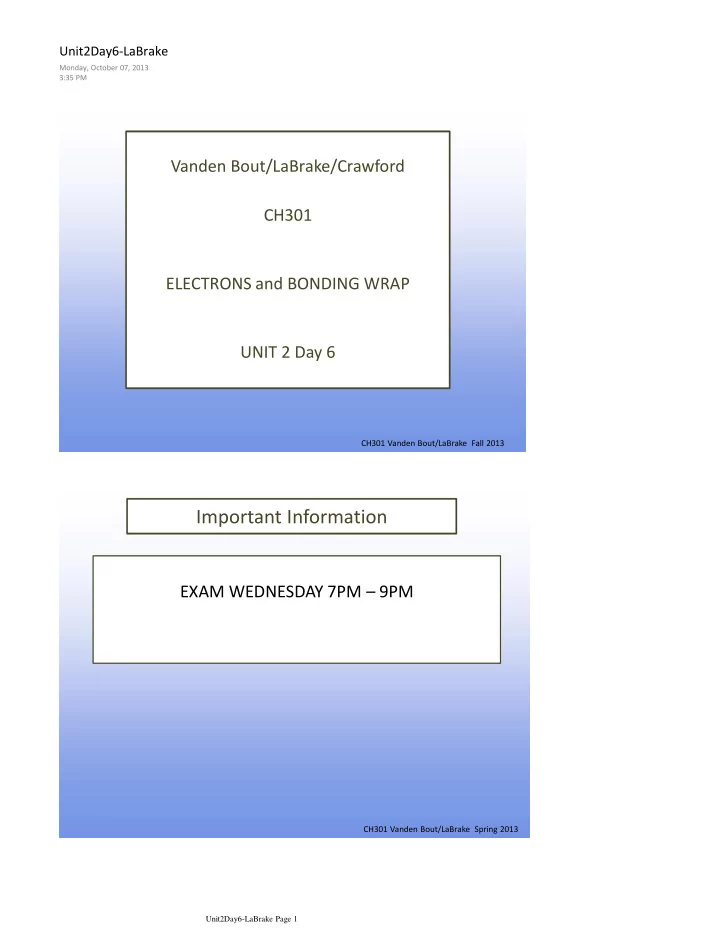

Unit2Day6-LaBrake Monday, October 07, 2013 3:35 PM Vanden Bout/LaBrake/Crawford CH301 ELECTRONS and BONDING WRAP UNIT 2 Day 6 CH301 Vanden Bout/LaBrake Fall 2013 Important Information EXAM WEDNESDAY 7PM – 9PM CH301 Vanden Bout/LaBrake Spring 2013 Unit2Day6-LaBrake Page 1
QUIZ: CLICKER QUESTION 1 Which of the of following is the electronic configuration for K and K + , respectively? a)1s 2 2s 2 2p 6 3s 2 3p 6 4s 1 ; 1s 2 2s 2 2p 6 3s 2 3p 6 4s 1 a)1s 2 2s 2 2p 6 3s 2 3p 6 4s 1 ; 1s 1 2s 2 2p 6 3s 2 3p 6 4s 1 a)1s 2 2s 2 2p 6 3s 2 3p 6 4s 1 ; 1s 2 2s 2 2p 6 3s 2 3p 6 a)1s 2 2s 2 2p 6 3s 2 3p 6 4s 1 ; 1s 2 2s 2 2p 6 3s 2 3p 6 4s 2 CH301 Vanden Bout/LaBrake Fall 2013 Relate electron configuration to periodic table QUIZ: CLICKER QUESTION 2 A laser pulse shines for 10 s delivering a total energy of 4 mJ of 633 nm light. Another laser delivers the same amount of energy with a wavelength of 408 nm. Which laser is delivering more photons to the sample? Unit2Day6-LaBrake Page 2
QUIZ: CLICKER QUESTION 2 A laser pulse shines for 10 s delivering a total energy of 4 mJ of 633 nm light. Another laser delivers the same amount of energy with a wavelength of 408 nm. Which laser is delivering more photons to the sample? A) RED Laser B) BLUE Laser C) BOTH ARE THE SAME D) NOT ENOUGH INFORMATION CH301 Vanden Bout/LaBrake Fall 2013 QUIZ: CLICKER QUESTION 3 and 4 Each of these lasers shines on calcium ( = 2.90 eV). What will happen when a 10 s pulse of red laser shines on calcium? a) NOTHING b) Electrons will be ejected c) Electrons will be ejected, but fewer than for the blue laser What will happen when a 10 s pulse of the blue laser shines on calcium? a) NOTHING b) Electrons will be ejected c) Electrons will be ejected, but there will be fewer than for the red laser CH301 Vanden Bout/LaBrake Fall 2013 Unit2Day6-LaBrake Page 3
2. Please explain the change in effective nuclear charge, Z eff , as you move across a row in the periodic table from left to right. Indicate how this change in Z eff affects the ionization energy and the atomic radii of the atoms as you move across a row. Use the elements calcium and selenium as specific examples predicting which would have the smaller atomic nucleus and why. CH301 Vanden Bout/LaBrake Fall 2013 EXPLANATION SPACE CH301 Vanden Bout/LaBrake Fall 2013 Unit2Day6-LaBrake Page 4
QUIZ: CLICKER QUESTION 5 Please write out the electron configuration for Germanium, Ge, using the noble gas short hand method a) [Ar]3s 2 3p 6 4s 2 3d 10 4p 2 b) [Ar] 4s 2 4p 2 c) [Ar] 4s 2 3d 10 4p 2 d) [Kr] 4s 2 3d 10 4p 2 e) [Kr] 4s 2 4p 4 CH301 Vanden Bout/LaBrake Fall 2013 QUIZ: CLICKER QUESTION 6 Given that the correct electron configuration for Germanium, Ge is: [Ar] 4s 2 3d 10 4p 2 Which of the following sets of quantum numbers will not be an allowed set for an electron in the ground state of Ge? a) 1,0,0,½ b) 4,1,0,½ c) 3,1,1,½ d) 4,2,-2,½ e) 4,1,-1,-½ CH301 Vanden Bout/LaBrake Fall 2013 Unit2Day6-LaBrake Page 5
QUIZ: CLICKER QUESTION 6 Please draw the Lewis structure for the molecule, oxalate ion, C 2 O 4 2- . The formal charge for each atom in the structure is correct in which diagram? CH301 Vanden Bout/LaBrake Fall 2013 QUIZ: CLICKER QUESTION 7 The concept of electronegativity refers to: a)The notion that metals tend to lose electrons to form cations. b)The notion that nonmetals have a greater affinity for electrons, so will tend to form anions to achieve a noble gas type electron configuration. c)The notion that within the context of a covalent bond, an atom which has a stronger affinity for electrons will attract the shared pair to a greater extent. d)The notion that covalent compounds share their bonding pairs electrons equally between atoms producing pure covalent or non polar type bonds. CH301 Vanden Bout/LaBrake Fall 2013 Unit2Day6-LaBrake Page 6
CH302 Vanden Bout/LaBrake Fall 2012 What have we learned? Electromagnetic radiation interacts with matter. Understanding EM radiation, helps to understand matter on the micro-scale. The physical model of the behavior of teeny tiny things is quite complicated and difficult to understand. The number of protons and the number and arrangement of electrons is important for predicting the chemical properties of the elements. You can abbreviate complicated electron configurations using a series of numbers and letters. The periodic table is your friend. You can name compounds. You can understand the structure of ionic compounds. You can predict basic bonding in CH302 Vanden Bout/LaBrake Fall 2013 molecules using Lewis structures.1 Unit2Day6-LaBrake Page 7
Recommend
More recommend